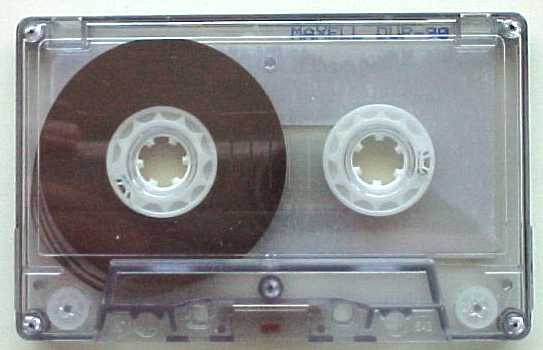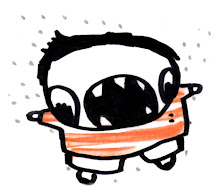Scary Monsters
 When digital audio hit, a lot of tracks were "remastered". What this often meant was going back to the quarter-inch electro-magnetic master tapes, and recording these onto the nearest available digital system. Often, beginnings and endings were changed, deemed to be too poor quality to survive the transition, once the digital playback mechanisms like CD and DAT made hiss and scratches things of the past. Some tracks became far less impressive as a result, having their subtle fade ins and outs artlessly chopped and curtailed. Neil Young once referred to the first 10 years of digital music as a lost decade.
When digital audio hit, a lot of tracks were "remastered". What this often meant was going back to the quarter-inch electro-magnetic master tapes, and recording these onto the nearest available digital system. Often, beginnings and endings were changed, deemed to be too poor quality to survive the transition, once the digital playback mechanisms like CD and DAT made hiss and scratches things of the past. Some tracks became far less impressive as a result, having their subtle fade ins and outs artlessly chopped and curtailed. Neil Young once referred to the first 10 years of digital music as a lost decade.I still have the first two 7" singles I bought in 1970, as a wee South London bairn from a family surviving on 2 old pence a year. One of them is Space Oddity by David Bowie. My vinyl version is vastly better than the remaster. It begins with the sound of the stylus hitting the groove and falling into place. Then out of the analogue scrape drifts in the acoustic guitar, as the song begins it's countdown "10... ground control to Major Tom... 9...8... commencing countdown, engines on... 7..."
 It's a classic songwriter's ruse to cash in on the news, and such a calculated song that it should be charmless, but Bowie being the South London fruitcake he is puts such a strange twist on being an astronaut, and the song is so very stoned, that it still works in it's spacey, mellotron-soaked, rock-opera way.
It's a classic songwriter's ruse to cash in on the news, and such a calculated song that it should be charmless, but Bowie being the South London fruitcake he is puts such a strange twist on being an astronaut, and the song is so very stoned, that it still works in it's spacey, mellotron-soaked, rock-opera way.David Bowie's really good work came later, a great swathe of writing and recording throughout the 70s and early 80s, from Aladdin Sane to his last great album, Scary Monsters, after which he made Let's Dance. This gave him the perfect opportunity to sell out, which he promptly took, and to be honest, he hasn't done anything as good since.
I don't blame him for selling out though. His close friend, John Lennon, the man with whom he co-wrote Fame was shot dead. In Scary Monsters Bowie refers to it, almost giving prior warning of his intentions of slipping into something more casual. Reagan was voted in, Russia invaded Afghanistan, Central America was in flames, the Cold War was reaching it's tense denoument, the 60s advances were being rolled back, and it really was no game anymore.
It's No Game (Part 1)
1
2
1-2-2
Shiruetto ya kage ga
Kakumei o miteiru
Mo tengoku no giyu no kaidan wa nai
Silhouettes and shadows watch the revolution
No more free steps to heaven
It's no game
Ore genjitsu kara shime dasare
Nani ga okkote irunoka wakara nai
Doko ni kyokun wa arunoka
Hitobito wa yubi o orareteiru
Konna dokusaisha ni iyashime rareru nowa kanashii
I am bored from the event
I really don't understand the situation
But it's no game
Documentaries on refugees
Couples 'gainst the target
You throw a rock against the road
And it breaks into pieces
Draw the blinds on yesterday, and it's all so much scarier
Put a bullet in my brain, and it makes all the papers
Nammin no kiroku eiga
Hyoteki o se ni shita koibito tachi
Michi ni ishi o nage reba
Kona gona ni kudake
Kino ni huta o sureba
Kyohu wa masu
Ore no atama ni tama o buchi kome ba
Shinbun wa kaki tateru
There's always tomorrow when people have their fingers broken
To be insulted by these fascists - it's so degrading
And it's no game
Shutup! Shutu...
David Bowie, from Scary Monsters
Bowie has written so many great songs it's impossible to give just one of them as a good example. He was influenced and knew all the greats from Burroughs to Eno, worked with cut-ups and randomised text to inspire unusual word collisions, invented production techniques that were widely copied, but he always seemed to find a populist way of being an arty pretentious git that made you love the songs and remember the lyrics.
Fame was a wonderful one-off collaboration between Carlos Alomar, Bowie and Lennon, which still has a fabulously modern New York disco-funk sound.
Fame
Fame, makes a man take things over
Fame, lets him loose, hard to swallow
Fame, puts you there, where things are hollow
Fame
Fame, it's not your brain, it's just the flame
that burns the change to keep you insane
Fame
Fame, what you like is in the Limo
Fame, what you get is no tomorrow
Fame, what you need you have to borrow
Fame
Fame, "Nien! It's mine!" is just his line
to bind your time, it drives you to, ah, crime
Fame
Could it be the best, could it be?
Really be, really, babe?
Could it be, my babe, could it, babe?
Really be, really, babe?
Is it any wonder
I reject you first?
Fame, fame, fame, fame
Is it any wonder
you're too cool to fool
Fame
Fame, bully for you, chilly for me
Got to get a rain-check on pain
Fame
{vocoder}
ba ba be
ba be ba be
ba be ba be
ba ba ba ba
ba ba
baby, baby
baby
Fame
What's your name?
{whispered}
Feelin' so gay
Feelin' gay
David Bowie / John Lennon / Carlos Alomar
But the Bowie song I really like is not well-loved, it has a strangely ponderous, unconnected production, and an almost throwaway delivery. From the Heroes album, with all of it's declamation and opiate-inspired electronics and strange Germanic saxophone, I give you:
Sons of the Silent Age
Sons of the silent age
Stand on platforms blank looks and note books
Sit in back rows of city limits
Lay in bed coming and going on easy terms
Sons of the silent age
Pace their rooms like a cell's dimensions
Rise for a year or two then make war
Search through their one inch thoughts
Then decide it couldn't be done
Baby, I'll never let you go
All I see is all I know
Let's take another way down (sons of sound and sons of sound)
Baby, baby, I'll never let you down
I can't stand another sound
Let's find another way (sons of sound and sons of sound)
Sons of the silent age
Listen to tracks by Sam Therapy and King Dice
Sons of the silent age
Pick up in bars and cry only once
Sons of the silent age
Make love only once but dream and dream
Don't walk, they just glide in and out of life
They never die, they just go to sleep one day
Baby, I won't ever let you go
All I see is all I know
Let's take another way down (sons of sound and sons of sound)
Oh baby, baby, baby, I won't ever let you down
I can't stand another sound
Let's take another way in (sons of sound and sons of sound)
(Sons of sound and sons of sound)
Baby, baby, baby, fire away!
David Bowie, from Heroes
This came from a time when, though he may have been all messed up, on drugs, adopting a quasi-fascist pose he later regretted, Bowie was unafraid of controversy and creatively at a wonderful peak. Later on, he withdrew from making grand artistic statements, changed the drugs, and instead, became by his own admission, an "entertainment artist from the vaudeville tradition". Yet, when he was aiming impossibly high, unafraid of the assassin's gun, at least he was hitting an artistic target rarely achieved. On this basis, I can accept the occasional howlers and the 20 years of bollocks since then.
Thank you, Mr Jones of Beckenham, for making me totally unafraid to be utterly pretentious in my work, and limitless in the scope of my ambitions for it.
 There is a line which runs parallel to our own history, and that's the history of our songs.
There is a line which runs parallel to our own history, and that's the history of our songs. This history of all of our songs belongs to us all, and it runs like a multi-coloured line alongside our individual lives, mapping our collective course, informing our personal history and local cultural identity, and weaving a
This history of all of our songs belongs to us all, and it runs like a multi-coloured line alongside our individual lives, mapping our collective course, informing our personal history and local cultural identity, and weaving a  Where were you when? is a question every generation asks itself. I was on the top deck of a bus from Penge when I saw the Evening Standard lunchtime headline, and I still remember the shock I felt. If I was older, it would have been Kennedy's death. If I was younger, Kurt Cobain's. But for me there was only one working class hero - it was something to be - it was John Lennon.
Where were you when? is a question every generation asks itself. I was on the top deck of a bus from Penge when I saw the Evening Standard lunchtime headline, and I still remember the shock I felt. If I was older, it would have been Kennedy's death. If I was younger, Kurt Cobain's. But for me there was only one working class hero - it was something to be - it was John Lennon. There is only one song I can listen to today, and that's Patti Smith's Easter. Her love of visionary and symbolist poets regularly shows in her lyrics, and sometimes in mine. All is glowing.
There is only one song I can listen to today, and that's Patti Smith's Easter. Her love of visionary and symbolist poets regularly shows in her lyrics, and sometimes in mine. All is glowing. Jesus on the cross asked of God, "Why Have You Forsaken Me?" This surely is the most truly awful moment in the Passion, true evidence that Jesus was indeed human.
Jesus on the cross asked of God, "Why Have You Forsaken Me?" This surely is the most truly awful moment in the Passion, true evidence that Jesus was indeed human.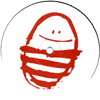 Ashley was mad then. Not always, but often. A delightful man, and still a friend I care for and respect. But I can say with some degree of authority that he had issues. Still has. It's just he loves them now. Ashley called me up late one afternoon and said, "We are short of a keyboard player tonight. Want to do a gig? It's local."
Ashley was mad then. Not always, but often. A delightful man, and still a friend I care for and respect. But I can say with some degree of authority that he had issues. Still has. It's just he loves them now. Ashley called me up late one afternoon and said, "We are short of a keyboard player tonight. Want to do a gig? It's local."  I have few perversions that you could really call perverse, and no fixations to speak of. I have them, of course, just not to speak of. I wish to state now, for the record, that I have always found women in boots highly attractive. There's a black and white picture of my mother looking terrific in a 60s mid-length coat, bottle-blonde beehive hair, and knee-length black leather boots, so I don't have to imagine why. At toddler age and height, I probably had a better relationship with her leather-clad calves than I did with any other part of the family. It's no surprise to Mr Freud that to this day, I will look sooner and longer at a woman in boots (preferably black and knee length) than anybody else.
I have few perversions that you could really call perverse, and no fixations to speak of. I have them, of course, just not to speak of. I wish to state now, for the record, that I have always found women in boots highly attractive. There's a black and white picture of my mother looking terrific in a 60s mid-length coat, bottle-blonde beehive hair, and knee-length black leather boots, so I don't have to imagine why. At toddler age and height, I probably had a better relationship with her leather-clad calves than I did with any other part of the family. It's no surprise to Mr Freud that to this day, I will look sooner and longer at a woman in boots (preferably black and knee length) than anybody else. Lee wasn't short on material. In those days when being recording artist and songwriter did not by default go hand in hand, it was policy to cover other artists' songs,in the hopes that Dylan, Rolling Stones, and Beatles fans would rush to buy Nancy's offering, and thus increase her sales.
Lee wasn't short on material. In those days when being recording artist and songwriter did not by default go hand in hand, it was policy to cover other artists' songs,in the hopes that Dylan, Rolling Stones, and Beatles fans would rush to buy Nancy's offering, and thus increase her sales.  It's hard to believe now, but once, Sting wasn't the New Age Rainforest-Saving Aesthetically-Pompadoured Jazz-Pop-Rock Tantric Geriatric Cheekboned Geordie he is now. OK, he had the cheekbones, you could ski down them, if you fell against them you'd sever an artery, he'd take off in a cross wind. But once, he was musically respected. Once he was in a band that were considered to be the New Great Hope, The Police, and although this band never realised anything like their potential (could this have been anything to do with Stuart Copeland's ex-Head of CIA Dad?) for a couple of years, they had the songs, the looks, the fans, and the world at their feet.
It's hard to believe now, but once, Sting wasn't the New Age Rainforest-Saving Aesthetically-Pompadoured Jazz-Pop-Rock Tantric Geriatric Cheekboned Geordie he is now. OK, he had the cheekbones, you could ski down them, if you fell against them you'd sever an artery, he'd take off in a cross wind. But once, he was musically respected. Once he was in a band that were considered to be the New Great Hope, The Police, and although this band never realised anything like their potential (could this have been anything to do with Stuart Copeland's ex-Head of CIA Dad?) for a couple of years, they had the songs, the looks, the fans, and the world at their feet. Gordon, Stripy Sumner of the North-East, him and his bass playing jazz-tinged chipmonk-voiced black-imitation soul, lost me with his atrocious single Da-Do-Do-Do, but he got me with this one. It's tight, sparse, moody, and unmistakable. I was walking back from her house, walking on the moon, my feet hardly touched the ground, I was walking on the moon, that was me.
Gordon, Stripy Sumner of the North-East, him and his bass playing jazz-tinged chipmonk-voiced black-imitation soul, lost me with his atrocious single Da-Do-Do-Do, but he got me with this one. It's tight, sparse, moody, and unmistakable. I was walking back from her house, walking on the moon, my feet hardly touched the ground, I was walking on the moon, that was me. 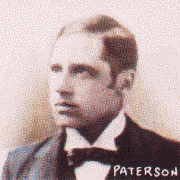 This is Andrew "The Banjo" Barton Paterson, the author of Waltzing Matilda. He was born on February 17, 1864, at Narambla, New South Wales, not far from Orange, the son of a Scottish immigrant from Lanarkshire, who had arrived in Australia in the early 1850s.
This is Andrew "The Banjo" Barton Paterson, the author of Waltzing Matilda. He was born on February 17, 1864, at Narambla, New South Wales, not far from Orange, the son of a Scottish immigrant from Lanarkshire, who had arrived in Australia in the early 1850s.  Jane I will forever thank for one reason, which is her contribution to my musical development. She bought me "New Boots and Panties" by Ian Dury and the Blockheads, for my 17th birthday, and 7 days later on a Saturday night, armed with condoms bought from the machine in the Blue Anchor, left alone for the purposes of petting, we went for it in my parents front room. The entire family was present in the house elsewhere, kept only in place by the TV, but somehow, we had ceased to care whether or not we were interrupted. Passion and persuasion overwhelmed inhibition, the condom went on, and my past life as a virgin began.
Jane I will forever thank for one reason, which is her contribution to my musical development. She bought me "New Boots and Panties" by Ian Dury and the Blockheads, for my 17th birthday, and 7 days later on a Saturday night, armed with condoms bought from the machine in the Blue Anchor, left alone for the purposes of petting, we went for it in my parents front room. The entire family was present in the house elsewhere, kept only in place by the TV, but somehow, we had ceased to care whether or not we were interrupted. Passion and persuasion overwhelmed inhibition, the condom went on, and my past life as a virgin began.
 I could not get it out of my head. The Stranglers followed up with better, but then a couple of years later came 2-Tone, which was both Punk and Funk. This rescued me from my confusion. At last, a music I could love wholeheartedly, I could sing, I could dance, and I could 100% feel the lyrics. In 1981, as the nation faced disaster, we found a popular voice.
I could not get it out of my head. The Stranglers followed up with better, but then a couple of years later came 2-Tone, which was both Punk and Funk. This rescued me from my confusion. At last, a music I could love wholeheartedly, I could sing, I could dance, and I could 100% feel the lyrics. In 1981, as the nation faced disaster, we found a popular voice. 
 According to this BBC report, entitled
According to this BBC report, entitled  Ask the average man in the street what he thinks about women having 1000 more genes than men. They won't be surprised. What's 1000 pairs of jeans when she already has 2000 pairs of shoes? But, here's the Big Nub:
Ask the average man in the street what he thinks about women having 1000 more genes than men. They won't be surprised. What's 1000 pairs of jeans when she already has 2000 pairs of shoes? But, here's the Big Nub: 
 The naive sweetness of the melody sounds a warning note clear across the decades, against uniformity of expectation, drab quality of life and the perpetuation of chauvinist values. Inside the boxes rotted the nuclear family. Suburban isolation tore into the soul of caged mothers who dutifully swallowed their green and pink and yellow and blue "medication", as an entire straight generation trapped in this degraded lifestyle got hooked on legal drugs, while the media focus was on the illegal ones favoured by the beat and hippy counter-culture. Valium, anyone, with your Martini?
The naive sweetness of the melody sounds a warning note clear across the decades, against uniformity of expectation, drab quality of life and the perpetuation of chauvinist values. Inside the boxes rotted the nuclear family. Suburban isolation tore into the soul of caged mothers who dutifully swallowed their green and pink and yellow and blue "medication", as an entire straight generation trapped in this degraded lifestyle got hooked on legal drugs, while the media focus was on the illegal ones favoured by the beat and hippy counter-culture. Valium, anyone, with your Martini?
 One month previously I had been spitting out my toothpaste when I gave a start of alarm. In among the foaming Colgate was dark red, brown. Shit! Blood. I rinsed my mouth with clean water and inspected my teeth in the mirror, looking for gum damage. Nothing. I tilted the mirror, inspecting my tongue, my palette. Clean. The back of my throat looked a bit red. I had been smoking for 3 years, mostly spliffs, but I was also a tobacco addict in denial; taking the opportunity to enjoy my Camel Lights on the top of a bus, or when I thought nobody I knew was looking. In the evenings I would swap cigarettes for hash and tobacco with my student pals, which behaviour was de rigeur.
One month previously I had been spitting out my toothpaste when I gave a start of alarm. In among the foaming Colgate was dark red, brown. Shit! Blood. I rinsed my mouth with clean water and inspected my teeth in the mirror, looking for gum damage. Nothing. I tilted the mirror, inspecting my tongue, my palette. Clean. The back of my throat looked a bit red. I had been smoking for 3 years, mostly spliffs, but I was also a tobacco addict in denial; taking the opportunity to enjoy my Camel Lights on the top of a bus, or when I thought nobody I knew was looking. In the evenings I would swap cigarettes for hash and tobacco with my student pals, which behaviour was de rigeur. He said that it would be best if I had an X-Ray and he was referring me to St Anne's. I was putting my jumper and coat back on, and I felt a momentary chill as he said this, matter of fact, no indication of whether he thought I had something serious or not. I was young, so I just said "OK" and left, with the time-bomb now ticking. I waited 3 weeks, carried on at college, but I was edgy and I kept off the smokes somewhat. Then one day a brown paper envelope arrived with my x-ray appointment. There it was, on the door mat of the semi-habitable Wood Green co-op house. I picked it up as I left, put it in my coat pocket, didn't open it until that evening. 7 days time. That was quick.
He said that it would be best if I had an X-Ray and he was referring me to St Anne's. I was putting my jumper and coat back on, and I felt a momentary chill as he said this, matter of fact, no indication of whether he thought I had something serious or not. I was young, so I just said "OK" and left, with the time-bomb now ticking. I waited 3 weeks, carried on at college, but I was edgy and I kept off the smokes somewhat. Then one day a brown paper envelope arrived with my x-ray appointment. There it was, on the door mat of the semi-habitable Wood Green co-op house. I picked it up as I left, put it in my coat pocket, didn't open it until that evening. 7 days time. That was quick. Every five minutes or so, another ribcage would "CLACK!" up on the light box. People would shuffle or be wheeled in and out. After 30 minutes or so, no further instruction, no member of staff to ask. No sign of mine. I bit my nails. I started to surreptitiously pace, like a member of the resistance, undiscovered but trapped in an enemy-occupied train station. It was worse than wating for Argos.
Every five minutes or so, another ribcage would "CLACK!" up on the light box. People would shuffle or be wheeled in and out. After 30 minutes or so, no further instruction, no member of staff to ask. No sign of mine. I bit my nails. I started to surreptitiously pace, like a member of the resistance, undiscovered but trapped in an enemy-occupied train station. It was worse than wating for Argos.
 Spring is here. I know that because the daffodils are out, though they held back for 10 days in the cold, they are all green and yellow now, out like proper gay flowers, bob-bob-bobbing their trumpetheads in the municipal parks, so many moshers waiting for the guitar solo to go apeshit.
Spring is here. I know that because the daffodils are out, though they held back for 10 days in the cold, they are all green and yellow now, out like proper gay flowers, bob-bob-bobbing their trumpetheads in the municipal parks, so many moshers waiting for the guitar solo to go apeshit.














 There is an election coming and I have been inundated by politicians of all flavours seeking endorsements from this very Blog of Funk, none of whom stand a chance. Of course I will not endorse them, as none of them are sufficiently anarchic, and it was saddening to see the moist eyes and quivering bottom lips on grown men and women in grey suits as I shut the door on them. Charles Kennedy was still there after an hour, so we took him to the pub, but the mean Scots stereotype sod wouldn't stand his round, and demanded whisky from us! Tsk. Does he not know the price of a double Glenfiddich? Does he not understand that this hole in his pub accounting undermines the excellent liberal, progressively social aims of his party?
There is an election coming and I have been inundated by politicians of all flavours seeking endorsements from this very Blog of Funk, none of whom stand a chance. Of course I will not endorse them, as none of them are sufficiently anarchic, and it was saddening to see the moist eyes and quivering bottom lips on grown men and women in grey suits as I shut the door on them. Charles Kennedy was still there after an hour, so we took him to the pub, but the mean Scots stereotype sod wouldn't stand his round, and demanded whisky from us! Tsk. Does he not know the price of a double Glenfiddich? Does he not understand that this hole in his pub accounting undermines the excellent liberal, progressively social aims of his party?  Several musicians desperate to include me on their new album have been in touch - and I have had to say, No, George, No, Robbie, No, Kylie, even with the
Several musicians desperate to include me on their new album have been in touch - and I have had to say, No, George, No, Robbie, No, Kylie, even with the 









 It's one of the anachronisms of British Government that when you are in the House of Commons (the law-making chamber) you don't refer to it by it's normal name. Instead, convention demands that you call it "this place" and the House of Lords (the revising chamber) "the other place".
It's one of the anachronisms of British Government that when you are in the House of Commons (the law-making chamber) you don't refer to it by it's normal name. Instead, convention demands that you call it "this place" and the House of Lords (the revising chamber) "the other place". This rejection of the UK Government's plans following on from that ruling was comprehensive, well argued, and substantial, thanks to the stature of the people who stood up for all our rights. Baroness Kennedy (my pin-up for March) quoted Martin Luther King - the passage about doing what is right, rather than what is politic, as they all voted for their consciences. Tony Blair's own mentor Lord Irvine, who first employed him in Law, even voted against him.
This rejection of the UK Government's plans following on from that ruling was comprehensive, well argued, and substantial, thanks to the stature of the people who stood up for all our rights. Baroness Kennedy (my pin-up for March) quoted Martin Luther King - the passage about doing what is right, rather than what is politic, as they all voted for their consciences. Tony Blair's own mentor Lord Irvine, who first employed him in Law, even voted against him. 









 The vestry was a dark room at the end of the church opposite the altar, divided into two areas, the vicar's dressing room and the choir's, with a the rope for the single bell hanging down between them. It contained vestments, hanging thickly upon Victorian pegs, piles of hassocks to prevent knee-injuries when praying to the Lord, and stacks of green hymn books and bibles and books of common prayer. Whatever the season or the weather, it had a permanently musty smell, just this side of mouldy, and slowly from about 9am it would sort of fill with a desultory group of children, and a couple of staunch, greying Anglican baritones, one with only one arm, who would attempt to prevent total war breaking out before the service with a series of glares and hushed admonitions designed to instill reverence. Our puerile minds knew none of this; we were mostly there under sufferance, to do a job, and get the hell out. It was a philosophy of which Arnie would have been proud.
The vestry was a dark room at the end of the church opposite the altar, divided into two areas, the vicar's dressing room and the choir's, with a the rope for the single bell hanging down between them. It contained vestments, hanging thickly upon Victorian pegs, piles of hassocks to prevent knee-injuries when praying to the Lord, and stacks of green hymn books and bibles and books of common prayer. Whatever the season or the weather, it had a permanently musty smell, just this side of mouldy, and slowly from about 9am it would sort of fill with a desultory group of children, and a couple of staunch, greying Anglican baritones, one with only one arm, who would attempt to prevent total war breaking out before the service with a series of glares and hushed admonitions designed to instill reverence. Our puerile minds knew none of this; we were mostly there under sufferance, to do a job, and get the hell out. It was a philosophy of which Arnie would have been proud.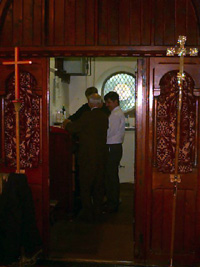

 I had taken an old Flintstones record and I was scratching it. Not with decks like the B-Boys of New York, but with the equipment I had available to me at art school, namely, my girlfriend's old Philips record deck, which had a really stiff playing arm you could lift slightly out of the microgroove, creating ever changing loops as the record failed to progress, a Marantz cassette deck, one of two portable location recording devices, both of which rewind buttons I totally knackered by my constant use, and a four track Teac reel-to-reel.
I had taken an old Flintstones record and I was scratching it. Not with decks like the B-Boys of New York, but with the equipment I had available to me at art school, namely, my girlfriend's old Philips record deck, which had a really stiff playing arm you could lift slightly out of the microgroove, creating ever changing loops as the record failed to progress, a Marantz cassette deck, one of two portable location recording devices, both of which rewind buttons I totally knackered by my constant use, and a four track Teac reel-to-reel.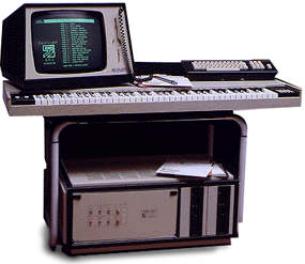 I was serious about my audio and video, spending hours in and out of college trying to emulate the sounds I could hear in the music I loved. I had a digital delay line with which I could trap about a second and a half; with M across the road, I built a sampler in a biscuit tin, which used a ZX Spectrum, good for another second or so. Multi-layered tape loops, with their inevitable, unpredictable audio decay as the magnetic oxide deposited itself on the playback head, provided an interesting and subtle backdrop for the tiny impact of stolen moments, and finally, an old analog two-oscillator synthesiser was good for drones but too Rick Wakeman for anything else.
I was serious about my audio and video, spending hours in and out of college trying to emulate the sounds I could hear in the music I loved. I had a digital delay line with which I could trap about a second and a half; with M across the road, I built a sampler in a biscuit tin, which used a ZX Spectrum, good for another second or so. Multi-layered tape loops, with their inevitable, unpredictable audio decay as the magnetic oxide deposited itself on the playback head, provided an interesting and subtle backdrop for the tiny impact of stolen moments, and finally, an old analog two-oscillator synthesiser was good for drones but too Rick Wakeman for anything else.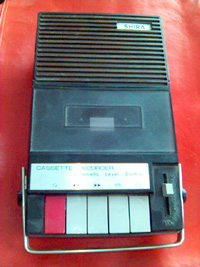 I had started this voyage aged 10, when my brother returned from Japan bearing one of the first transistorised hand-held cassette recorders anyone had ever seen. He grew bored of it, I inherited it. The microphone had a stop-start button which if you operated it during recording caused the sound to distort comically. These were the days that video cameras did not exist, and neither did audio recorders with built-in condenser microphones. I was an innocent-looking kid with a pale face and dark rings under my eyes, asking adults to speak. "Have you ever heard yourself?" I would say, proffering the mike. "No." most often the reply. "Would you like to?" "Oooh I'm not so sure..." Meanwhile, I was already recording, with my thumb busily changing the speed of the tape. "Listen, I'll play it back for you." "OOoooooooOOOOooooooH Eeerrriiiimmm NOTSOSURE" the ghostly weird scrambled parody of themselves uttered from the built-in speaker. I would watch a range of faces from astonishment to confusion to delight to annoyance, ready to run if the going got nasty.
I had started this voyage aged 10, when my brother returned from Japan bearing one of the first transistorised hand-held cassette recorders anyone had ever seen. He grew bored of it, I inherited it. The microphone had a stop-start button which if you operated it during recording caused the sound to distort comically. These were the days that video cameras did not exist, and neither did audio recorders with built-in condenser microphones. I was an innocent-looking kid with a pale face and dark rings under my eyes, asking adults to speak. "Have you ever heard yourself?" I would say, proffering the mike. "No." most often the reply. "Would you like to?" "Oooh I'm not so sure..." Meanwhile, I was already recording, with my thumb busily changing the speed of the tape. "Listen, I'll play it back for you." "OOoooooooOOOOooooooH Eeerrriiiimmm NOTSOSURE" the ghostly weird scrambled parody of themselves uttered from the built-in speaker. I would watch a range of faces from astonishment to confusion to delight to annoyance, ready to run if the going got nasty.